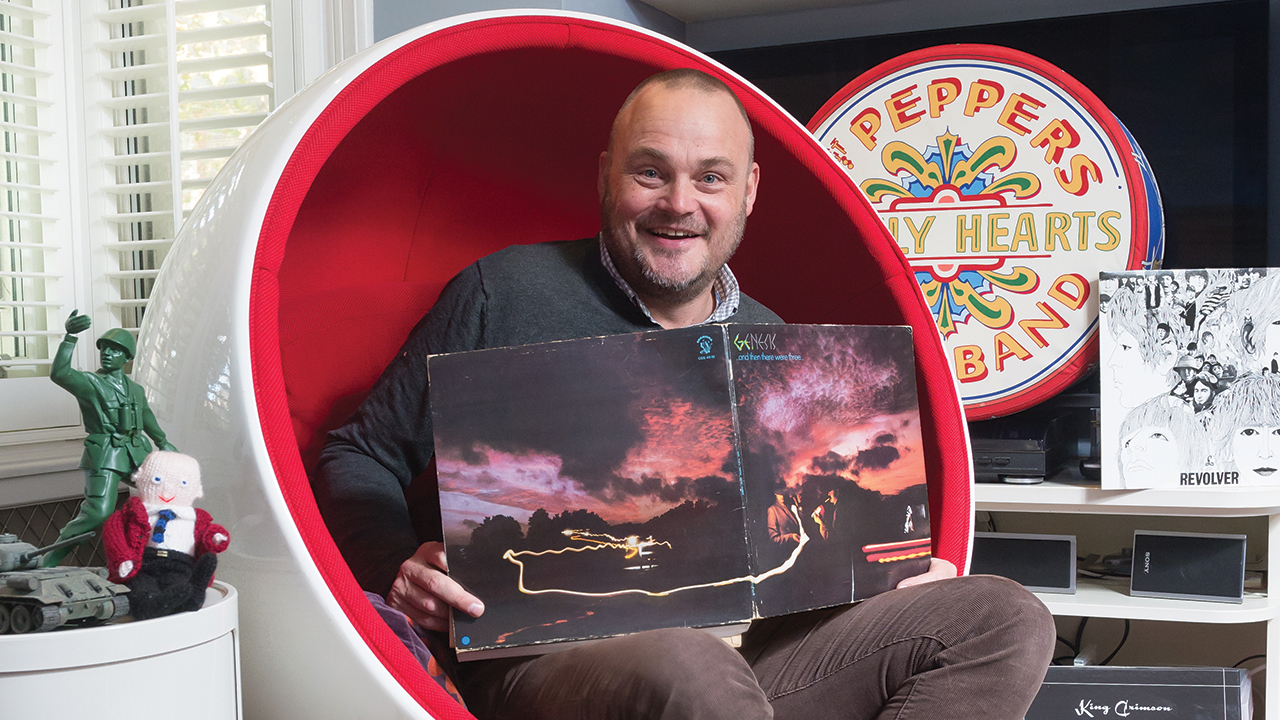“I went to boarding school in Bedford and everyone was into punk. I thought, ‘I want to be into something for myself, how can I carve out my own thing?’ Someone had a copy of Genesis’ Seconds Out so I got into that. The sound of strings doesn’t frighten me, I don’t come at prog thinking that it’s elitist music. I played in orchestras growing up and they were not elite, they were people scraping away to make a nice sound. So I don’t have an allergy to musicianship or classical music. I was always coming at rock music with that on board.
The first album I bought was And Then There Were Three. You’d go into Andy’s Records in Bedford with four quid in your pocket and you’d think, ‘Well, I like that band but I can’t afford that double album, so what can I get?’ It was all about cassette tapes for me because at school you couldn’t have a record player and you had to pack things away neatly, like being in the army. So you might not buy that expensive double, but you’d get what was in your price bracket. Browsing in record shops would be exactly how Nick Hornby describes it [in High Fidelity], you don’t just look at the records you want, but the ones you already have. You’re touching base. I was looking at stuff I couldn’t afford and I’d be thinking, ‘One day I’ll buy that copy of Relayer.’
I’d learn about prog through making friends who were into it. When I got to uni – I studied History at Oxford – on my first weekend, I met Simon Oakes [from Suns Of The Tundra] and he had a tape of Genesis at Knebworth – wow, that was like gold dust. At uni I had more money to spend and that’s when I really started listening to music, and playing music. I’d studied percussion at school and I played in a jazz band there. On my year off I was in a covers band who I tortured into playing Solsbury Hill. I was like, ‘Right lads, this is in 7,’ and they’re like, ‘What the fuck are you on about?’ ‘Basically we miss a bit of the end of this bar, don’t worry, I’ll play it right. Don’t panic, we’ll get to the end.’ And then there’s be that bit where we’ve all got to really count. At uni I had a friend who was a massive Rush fan so occasionally you’d try and play some really difficult music. It was fun, but I always just tried to have a broader palette than fall back on the music I really love – I’m a big fan of lots of ‘normal’ rock and pop music too. Although I do remember a friend coming round with a Jane Siberry tape and me throwing it behind a cupboard because I wanted to listen to Larks’ Tongues In Aspic. I lied to him about it for ages. He still won’t know, he’s not a Prog subscriber [laughs].
From Larks’ Tongues to Red, that period of King Crimson is really amazing – you can’t take it as three records, it’s one hot stretch. Look at the YouTube footage, that music is angry for a reason, they’re all pushing to get space. When I moved into my first flat in London, Red was the soundtrack to nights in playing Risk. It’s my favourite Crimson album, and that’ll always stay with me.
I never got tribalism in music, if something’s good I’ll like it. But prog always felt like something I had to defend. Bowie walks along the faultline between rock and prog all the time. He inhabits the faultline, utilses it. Those Berlin albums are especially out there because Brian Eno’s an art rocker and then you’ve got Robert Fripp. You’re not going to have Fripp on a record and it come out ordinary.
- King Crimson: How We Made In The Court Of The Crimson King
- My Record Collection: Kavus Torabi
- My Record Collection: Noel Fielding
- Tape decks, drugs and Abbey Road: how The Beatles’ Revolver revolutionised rock
In the 90s, I listened to a lot of Beatles. Revolver is the first prog record of all, and their best record by a million miles. The constant stylistic shift, each track something one band alone would mine a career from. Tomorrow Never Knows is the invention modal, syncretic music that would become dance music – yes, the Beatles did that too.
Similarly, King Crimson’s In The Court Of The Crimson King isn’t the first prog album, it’s just the first that announces that it is. The Who had been mining that seam for years and you can hear their effect on Genesis. They want to be The Who but they’re too polite. They also want to be soul boys but if you’ve got a classically trained pianist in the band you’ll end up with Selling England By The Pound, which isn’t about having your heart broken but having your country broken, as worthwhile a lament as any love song. My favourite Genesis record? It’s a toss-up between The Lamb Lies Down On Broadway, no one’s made anything that good for a very long time, and Duke, which is a very compelling record. I follow Genesis through the ‘pop’ years too, because even singles like Mama are plain weird.
In the 80s and 90s prog lost its confidence, it had the shit kicked out of it and was told to go away. It went in on itself and doubled down on the gnarly bits rather than writing lovely melodies. Then people start not taking no for an answer and you get fantastic bands like Tool coming through. Lateralus sounds completely timeless, it’s it doesn’t sound like it’s been glued together like a Metallica record – and I love Metallica but their records do sound like they’ve been boiled in a bag a bit. You know Tool can play the record from start to finish. The promised new material is taking so long, though – Danny Carey is such an amazing drummer, you wanna hear him, you don’t want to be deprived of that band.
The stuff I’ve got into in the last year has stemmed from Steven Wilson’s Hand.Cannot.Erase.. I was completely beguiled by that record. I always liked Porcupine Tree but here he’s coming from pure melody and you get this witheringly good band playing it. From there you listen to Marco Minnemann, who I’m a little afraid of because he’s a drummer. The Aristocrats stuff is hilarious, then there’s Nick Beggs’ stuff, and Craig Blundell, who’s is a friend of mine and he does this prog dubstep grime project, Dr Octopus.
But my kids have influenced me on this last one: Elvis. They were really into him for a really long time and I don’t know where they found him, suddenly they wanted The Sun Sessions on all the time. Elvis is prog rock: he invents rock and roll by taking two things and sticking them together. He’s even wearing capes by the end of it. In his Vegas period he invents orchestration in rock and roll in the way Jon Anderson describes how he puts his own music together. Elvis would do that live, ‘I need a trombone here and the drummer to go nuts.’ All the time Ronnie Tutt’s going for it with a huge drum kit. If you leave Elvis out of this you’re making a fundamental mistake. He came onstage to Also Sprach Zarathustra, how much more prog could you be?”
Al Murray is on tour now as the Pub Landlord, see www.al-murray.com, or find him on Twitter @almurray.
Steven Wilson talks Hand. Cannot. Erase. on The Prog Show
The New Tool Album: 5 Things We Want From It
- Meet the best turntables for your record collection
- Smaller budget? No problem! These are the best budget turntables

